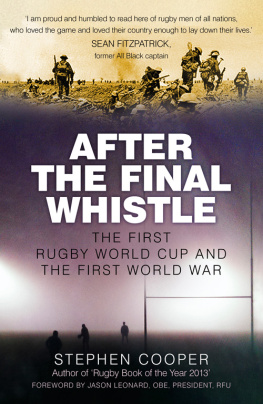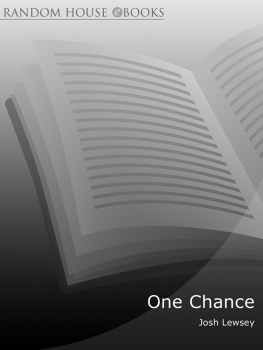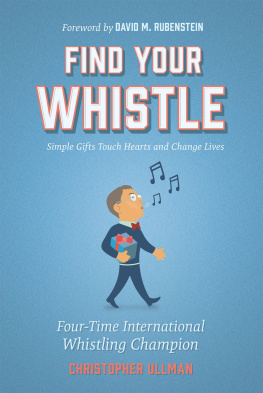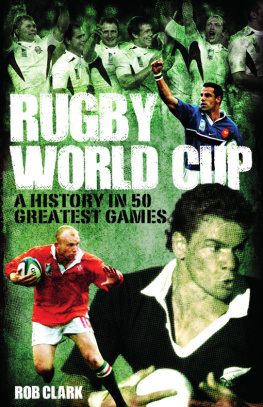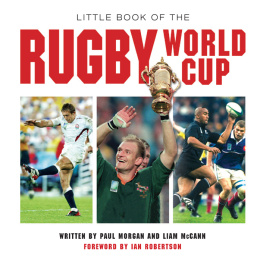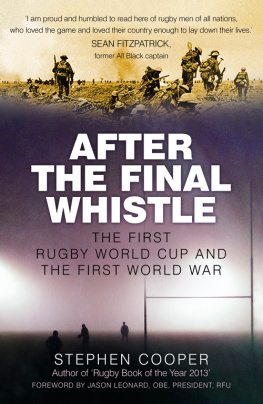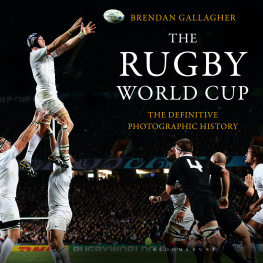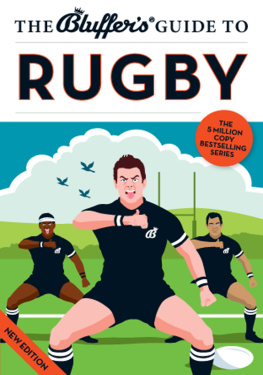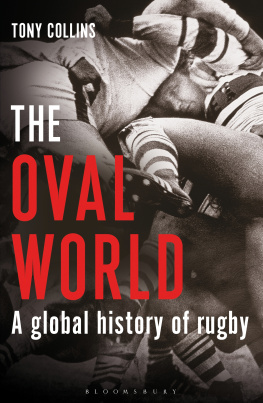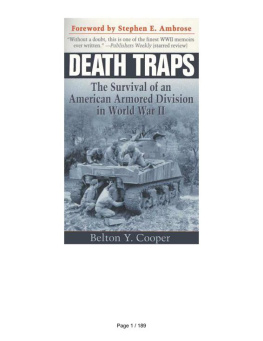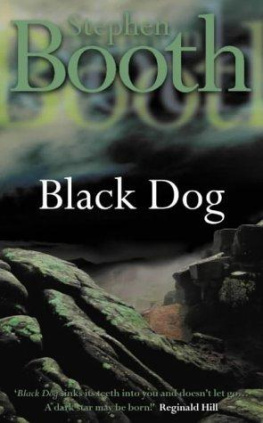Stephen Cooper - After the Final Whistle: The First Rugby World Cup and the First World War
Here you can read online Stephen Cooper - After the Final Whistle: The First Rugby World Cup and the First World War full text of the book (entire story) in english for free. Download pdf and epub, get meaning, cover and reviews about this ebook. year: 2015, publisher: The History Press, genre: Politics. Description of the work, (preface) as well as reviews are available. Best literature library LitArk.com created for fans of good reading and offers a wide selection of genres:
Romance novel
Science fiction
Adventure
Detective
Science
History
Home and family
Prose
Art
Politics
Computer
Non-fiction
Religion
Business
Children
Humor
Choose a favorite category and find really read worthwhile books. Enjoy immersion in the world of imagination, feel the emotions of the characters or learn something new for yourself, make an fascinating discovery.
- Book:After the Final Whistle: The First Rugby World Cup and the First World War
- Author:
- Publisher:The History Press
- Genre:
- Year:2015
- Rating:3 / 5
- Favourites:Add to favourites
- Your mark:
- 60
- 1
- 2
- 3
- 4
- 5
After the Final Whistle: The First Rugby World Cup and the First World War: summary, description and annotation
We offer to read an annotation, description, summary or preface (depends on what the author of the book "After the Final Whistle: The First Rugby World Cup and the First World War" wrote himself). If you haven't found the necessary information about the book — write in the comments, we will try to find it.
Stephen Cooper: author's other books
Who wrote After the Final Whistle: The First Rugby World Cup and the First World War? Find out the surname, the name of the author of the book and a list of all author's works by series.
After the Final Whistle: The First Rugby World Cup and the First World War — read online for free the complete book (whole text) full work
Below is the text of the book, divided by pages. System saving the place of the last page read, allows you to conveniently read the book "After the Final Whistle: The First Rugby World Cup and the First World War" online for free, without having to search again every time where you left off. Put a bookmark, and you can go to the page where you finished reading at any time.
Font size:
Interval:
Bookmark:
After the Final Whistle: The First Rugby World Cup and the First World War
In his award-winning The Final Whistle , Stephen Cooper concentrated on the extraordinary contribution his club Rosslyn Park made to the Great War by telling the story of 15 players who didnt come back. Now in After the Final Whistle Cooper broadens the scope massively and looks at the rugby soldiers of every Allied nation involved. Its an extraordinary and inspiring tale and concludes, after the Armistice, with teams from those military forces celebrating peace by going head to head in what many would describe as the first World Cup.
Brendan Gallagher, The Rugby Paper
A timely reminder of that fierce spirit which makes us all proud to be a part of rugby.
David Sole, former Scotland rugby union captain
As a rugby player and singer, it is impossible not to be moved by these powerful stories of rugby men in harms way. It is comforting to know that they did not die in vain and their nations anthems live on. There is silence in the stadium before I perform and then the eruption of sound in the thousands. Team-mates and supporters sing together, it is an incredibly powerful thing. Reading these stories now, gives each anthem a deeper meaning, it gives us our own identity.
Laura Wright, internationally renowned soprano,
rugby player and official RFU anthem singer
A triumph: a proper accompaniment to the Rugby World Cup further proof of the glorious civilising influence of Rugby Union.
Justin Webb, journalist and BBC Radio presenter
More praise for:
The Final Whistle: The Great War in Fifteen Players , Times Rugby Book of the Year 2013
This haunting and beautiful book tells the story of men from one rugby club but it is a universal narrative of heroism and loss. He writes superbly and has produced a book of commendable scholarship. I cannot recommend it enough.
Fergal Keane
A fresh and fascinating take on the impact of the Great War, with a novel and moving focus.
Ian Hislop
Sensitive, original and profoundly moving
Sir Anthony Seldon
An inspired idea to link rugby and the Great War in this way it brings home the pathos of these ardently lived lives an original and illuminating approach to this endlessly fascinating subject.
Edward Stourton
Stephen Cooper has written a book of beauty and sadness People use the word hero to describe sportsmen but the guys in this book are true heroes. A fantastic and inspiring read from the first page to the last.
Jason Leonard, Lions & England
a book of stunning quality a team-full of heartbreaking stories, each going in different and fascinating directions; poignant and powerful.
Alan Pearey, Rugby World Magazine
A fitting tribute not simply to 15 individuals cut down in their prime, but a paean to all those who died in the First World War.
Mark Souster, The Times

For Clark and Ken Miller:
Men of rugby and flowers of Scotland, cut down early.
L ike my first, this is a work of personal passion, not of historical erudition. It does not aim to be comprehensive and readers may regret the exclusion of many worthy players and stories; if so, you have my apologies. There are more detailed books in the bibliography if you wish to delve deeper. My thanks go to Jo De Vries and Donald Sommerville for their patience and expertise in improving this one.
In researching this book, I found that national identity mattered less than being part of a worldwide rugby family, then as now. Welshmen coached French teams and played for South Africa, South Africans played for England, Englishmen for Australia and Australians for Britain and the USA. Its a circle of life where mud is thicker than blood.
I am therefore grateful to an international rugby family who have adopted, tolerated and helped me. If I have overlooked anyone, I am mortified. From England: Michael Rowe, Mike Hagger, Richard Steele and Deborah Mason at the World Rugby Museum, Twickenham. Ian Minto, James Corsan, Nigel Gooding, Colin Veitch, Paul Brennan, David Bohl, Kate Wills, Allan Fidler, Kath Middleditch, Sam Cooper, Ian Metcalfe, Graham McKechnie, Jon Cooksey, John Lewis-Stempel, Gordon Brown, Ian Watmore, Jason Leonard, Bill Beaumont, Richard Daglish, Ron Hall, John Robertson, Jonathan Bunn, Shane Record, Ben Cooper, Roy Barton, Simon McNeill-Ritchie and Patrick Casey.
From Scotland and the exiled diaspora: Hugh Barrow, Paul McFarland, Sandy Fitzpatrick, Mark Taylor, Simon Wood, Ross Cameron, Andy Mitchell, Hugh Pym, Alan Weir, Richard McBrearty. From Canada: Cameron Tompkins, Keith Jolly, Allan Willox, Doug Sturrock. From Wales: Gareth Thomas, Gwyn Prescott and Brynmr Evans.
From New Zealand: Stephen Berg at the NZ Rugby Museum, Bettina Anderson, Clive Akers, Owen Eastwood, Alan Sciascia, Windsor Jones and Nicola Barrett at National Army Museum Te Mata Toa, Chris Clews and Susan Thomas of Ponsonby. From Australia: Gareth Morgan.
From Italy: Angela Teja, Elvis Lucchese, Luciano Ravagnani, Alberto Cellotto. From Ireland: Sharon Heffernan for her cover picture of son Fionn at Cill Dara training, Ciaran OMara. From South Africa: Paul Dobson, Nicky Bicket, Lady Maggie Robinson, Sir Peter Robinson, Floris van der Merwe, Tanya Whitehead.
From France: my guru, Frdric Humbert, and from Afghanistan: Asad Ziar.
Lines from A.P. Herberts Beaucourt Revisited are quoted by kind permission of the Executors of the Estate of Jocelyn Herbert, M.T. Perkins and Polly M.V.R. Perkins. The extract from Mametz Wood from Skirrid Hill by Owen Sheers (Seren, 2005) is reproduced by permission of the author, c/o Rogers, Coleridge & White Ltd, London W 11. Extracts from Greg Growden, Wallaby Warrior: The World War I diaries of Australias only British Lion , Allen & Unwin, 2013, are used by permission. The extract from Mick Imlahs London Scottish (1914) from The Lost Leader (2008) is copyright the estate of the author and reprinted by permission of Faber and Faber Ltd.
In 2015 we will celebrate rugbys values with an event that has its origins in war. We also commemorate the men whose sacrifice in that war a century ago, and others since, allows us the freedom to celebrate our game. In a detail buried in the bibliography, Australian captain Paddy Morans Viewless Winds was published in 1939 by Peter Davies Ltd. This was Peter Llewellyn Davies, who was awarded the Military Cross in the Great War. J.M. Barrie publicly identified him as the source for the name of Peter Pan, although his brother George, killed with the Rifle Brigade in 1915 , was perhaps more the model for The Boy Who Wouldnt Grow Up .
This label of the original Peter Pan haunted Davies throughout his life, which ended under a train at Sloane Square. In 2013 Charles Spencer, reviewing John Logans play Peter and Alice, observed that Ben Whishaws performance suggested a man irretrievably damaged by his experience of war, and who has painfully and repeatedly learned that the only reason boys dont grow up is because they die.
Indeed.
by
Jason Leonard, OBE
This year we welcome the nations of the world to our country for the worlds greatest celebration of rugby. England again hosts the Rugby World Cup for the first time since 1991, an occasion I remember well. Much has changed in our sport since then, not least the advent of professionalism; an event that started in the amateur era of 1987 is now the third largest sporting festival in the world.
But some things have not changed: I am pleased to say that rugbys values are as strong now as they were then. Those values of teamwork, respect, discipline, sportsmanship and enjoyment have always been there; they have made our game stand out, which is why we now talk about them openly and proudly.
Next pageFont size:
Interval:
Bookmark:
Similar books «After the Final Whistle: The First Rugby World Cup and the First World War»
Look at similar books to After the Final Whistle: The First Rugby World Cup and the First World War. We have selected literature similar in name and meaning in the hope of providing readers with more options to find new, interesting, not yet read works.
Discussion, reviews of the book After the Final Whistle: The First Rugby World Cup and the First World War and just readers' own opinions. Leave your comments, write what you think about the work, its meaning or the main characters. Specify what exactly you liked and what you didn't like, and why you think so.

